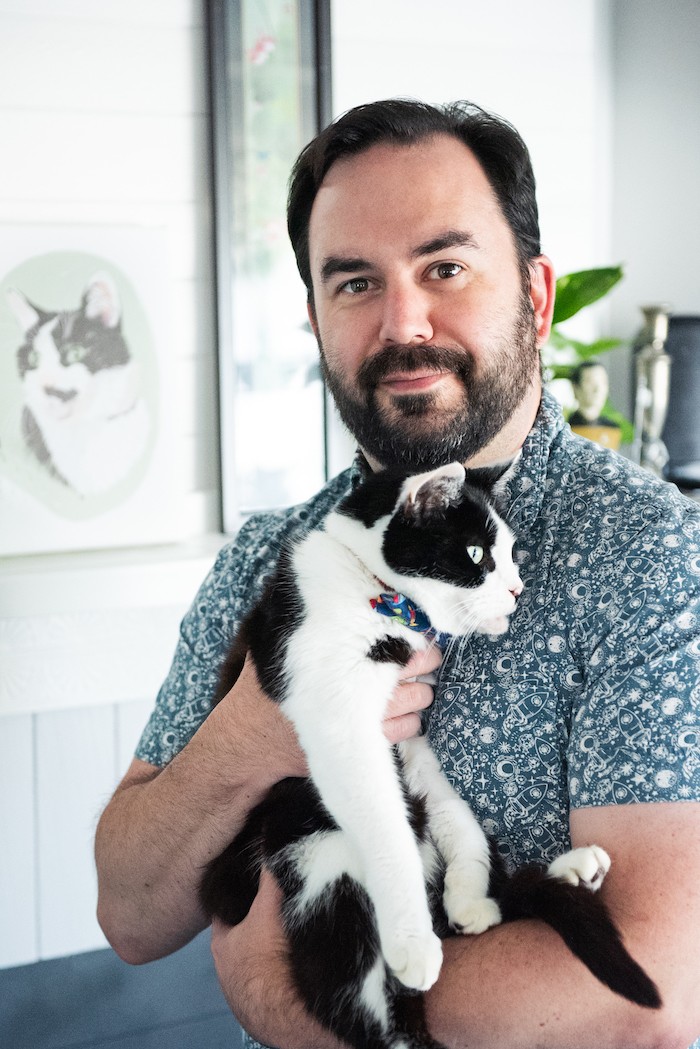A FEW DISTANT, ambient notes sound, and a man begins speaking. "No one has seen the trees this week," he says, in a deep, resonant voice. "Hopefully they'll come back soon. Welcome to Night Vale." The theme music swells, and one of the most popular and improbable podcasts on iTunes begins.
In the podcasting world, a landscape dominated by comedy, news, and information, Welcome to Night Vale is an anomaly. The episodic, fictional series takes the form of a community radio station from a small desert town. The town, Night Vale, is filled with hooded figures, government agents, and a miniature, warlike civilization that lives under the bowling alley. Each episode features the kind of news, traffic, and public service announcements that would dominate the airwaves if H.P. Lovecraft had his way with reality.
The central gimmick of Night Vale is that the town isn't actually that horrific of a place to live. Despite the killer librarians, glow clouds, dragons, and occasional pterodactyls, Night Vale seems to be a workable community by the terms of the people who inhabit it—on the whole, it's more alien than hellish. Night Vale does not so much strive to create an atmosphere where you think the Great Old Ones are going to appear at any moment; rather, it strives to be what the Great Old Ones might listen to on their evening commute.
Night Vale is about as independent a project as you can get. The two writers, Joseph Fink and Jeffrey Cranor, were theater buddies involved with New York's Neo-Futurists theater group. "This was something we started as a hobby," Fink says of the podcast's genesis. "There was no expectation from any of us that it would be anything more than that at all." The two writers enlisted their fellow Neo-Futurist Cecil Baldwin as the voice of Night Vale, and a show was born.
Each show has a primary plot (the most recent was about oranges that make you blink out of existence), and Fink and Cranor alternate writing duties for each episode. They also maintain a Google document of miscellaneous flourishes that could go into any episode, such as traffic warnings about existential despair, or advertisements for silence. After finalizing the script for an episode, they send it off to Baldwin for recording. Baldwin records on his own time, in his apartment, using a mid-range Snowball USB microphone. After recording, Baldwin sends the audio file to Fink for editing and production.
If it were just ennui and despair all the time, Night Vale would get old quickly—but the show is by turns funny, creepy, weird, and reminiscent of beat poetry. "If the previous couple of episodes have been particularly funny, I'll try to play up the darkness of the next episode," says Baldwin. "It gives the listener something different week to week and month to month, diversity in [what] they're listening to."
Despite the capricious nature of the setting, Night Vale is not a random, Kafka-esque construct. "From the beginning, we wanted to keep strict continuity," says Fink. "When you have a world that doesn't follow the rules of our world, it needs to follow some sort of rules or else there [are] no stakes. It needs to be consistent, or it doesn't work." Thirty-eight episodes in, Night Vale has developed a few major ongoing plots, such as the invasion of the town by an evil corporation and a mayoral election that involves a dragon. It all feels coherent and convincing, despite the strange subject matter.
The creators (again, three theater guys with some laptops and a cheap microphone) seem overwhelmed by the show's success. "Our expectations early on were that it would be cool if a couple hundred people listened to the show," says Cranor, who's at a loss to explain the show's sudden popularity. "Obviously it blew up from there. If somebody were to ask, 'How do you build an audience?' I'd say, 'I have no idea.'" Baldwin is adamant that he doesn't want success to dilute the quality of the work. "We continue to work on this podcast as if there are only 50 people listening," he says. "That's the best way we know to make a solid artistic product."




















